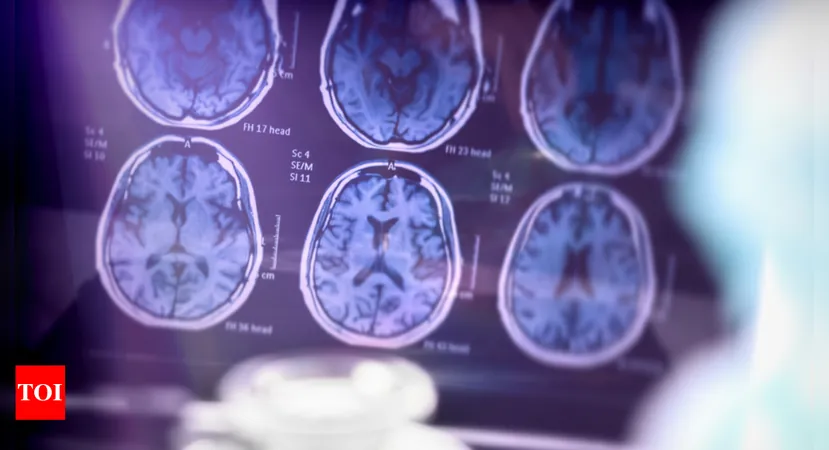
Alarming Discovery: Cold Sore Virus Could Open Doors to Alzheimer’s Disease!
2024-11-09
Author: Arjun
Recent findings from researchers at the University of Colorado Anschutz Medical Campus are sending shockwaves through the medical community. Their groundbreaking study reveals that the common cold sore virus, herpes simplex virus type 1 (HSV-1), is not just a nuisance but could play a significant role in the onset of Alzheimer's disease by invading critical brain cells.
Published in the Journal of Virology, the research uncovers the pathways through which HSV-1 infiltrates the brain, specifically targeting areas essential for sleep, mood regulation, and hormone balance. Traditionally known for causing cold sores, HSV-1 usually lies dormant in the body but can reactivate when the immune system is compromised. This activation may allow the virus to travel to the brain via the olfactory nerve, which is involved in the sense of smell, or the trigeminal nerve, linked to facial sensations.
Once the virus reaches the brain, it can provoke inflammation and immune responses that may damage neurons and promote the accumulation of beta-amyloid plaques, a hallmark of Alzheimer’s disease. Alarmingly, the study indicates that individuals with genetic vulnerabilities, such as those carrying the APOE4 gene, could be at even greater risk from HSV-1’s effects.
The Inflammatory Response: A Double-Edged Sword?
The inflammation triggered by the HSV-1 infection may activate microglial cells—crucial immune defenders in the brain. While these cells typically protect the brain, they can become harmful if overstimulated. Research shows that chronic activation of microglia may result in the sustained release of toxic substances that can further damage neuronal health.
Dr. Christy Niemeyer, a prominent researcher involved in the study, emphasized, “Understanding the mechanisms by which this common virus influences neurological diseases like Alzheimer’s is of utmost importance, as it could guide future therapies and preventive approaches.”
Charting the Path of HSV-1 in the Brain
Researchers meticulously mapped the virus's pathways to specific brain regions, including the brain stem, which regulates crucial functions like sleep and movement, and the hypothalamus, a hub for mood and hormonal control. Although HSV-1 does not typically cause severe encephalitis, its presence seems to subtly impair neuronal functioning, potentially leading to long-term cognitive decline.
Precautionary Measures: Protect Your Brain Health!
In light of these findings, health experts are urging people to take preventive steps against HSV-1 infections. Dr. Kunal Bahrani, a clinical neurologist, suggests that maintaining a robust immune system through a balanced diet, regular exercise, and effective stress management can help mitigate viral reactivations. For individuals prone to cold sores, antiviral treatments can help reduce the frequency and severity of outbreaks.
Hygiene is crucial in limiting HSV-1 spread. Avoid close contact with infected individuals and sharing personal items to decrease the risk of transmission. High-risk groups, such as those with weakened immune systems, older adults, and individuals with a history of severe cold sores, should consider regular neurological assessments to monitor any changes in health.
Who Faces the Highest Risk?
Certain individuals are particularly vulnerable to the impacts of HSV-1. Those undergoing chemotherapy, living with HIV/AIDS, or taking immunosuppressive medications may experience heightened risks of severe infections. Stress, whether physical or emotional, can also trigger reactivation, making it vital for those at risk to manage their stress levels proactively.
The potential connection between HSV-1 and Alzheimer’s disease not only raises pressing concerns but also underscores the importance of understanding how common viruses may influence our long-term brain health. As researchers continue to unlock the mysteries surrounding HSV-1, proactive measures and informed discussions with healthcare providers could be critical steps toward safeguarding cognitive function in at-risk populations.
Stay informed and empowered—your brain health could depend on it!





 Brasil (PT)
Brasil (PT)
 Canada (EN)
Canada (EN)
 Chile (ES)
Chile (ES)
 España (ES)
España (ES)
 France (FR)
France (FR)
 Hong Kong (EN)
Hong Kong (EN)
 Italia (IT)
Italia (IT)
 日本 (JA)
日本 (JA)
 Magyarország (HU)
Magyarország (HU)
 Norge (NO)
Norge (NO)
 Polska (PL)
Polska (PL)
 Schweiz (DE)
Schweiz (DE)
 Singapore (EN)
Singapore (EN)
 Sverige (SV)
Sverige (SV)
 Suomi (FI)
Suomi (FI)
 Türkiye (TR)
Türkiye (TR)